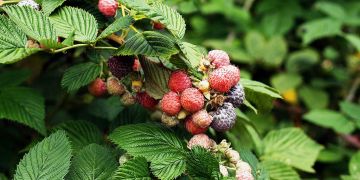Raspberries Latin Name
The raspberry is a member of the rose family, which shows in the thorny stems, bramble-like growth, shape of the leaves and blossoms. The two major groups are the Eurasian red raspberry, Rubus idaeus, and the eastern North American black raspberry, Rubus occidentalis. Cultivated plants are typically hybrids between R. idaeus and R. strigosus. Raspberries grow in most of the temperate regions north of the equator, often in swamps or bogs.
Active Ingredients
Polyphenols like tannins and flavonoids are the two primary constituents of raspberry leaves, according to the European Medicines Agency. Polyphenols act as antioxidants, which may help slow aging and diseases such as cancer. A study from the Medical University of Bialystok, in Poland, found that the flavonoids quercetin and kaempferol predominated in raspberry leaves. In addition, raspberry leaves contain phenolic acids, minerals, vitamin C and plant alcohols.
How to Take
Raspberry leaves are typically available as capsules, tablets or dried leaves. The leaves are used to make tea. Raspberry Leaf tea is very popular as a refreshing beverage. Doses vary according to the medical condition.
Health Benefits
The National Plant Data Center of the US Department of Agriculture reports that raspberry leaves were used to treat diarrhea and to aid in childbirth. Raspberry leaf tea is thought to help menstrual cramps. The leaves have also been used as a gargle to treat tonsillitis and mouth inflammations, or as a poultice or irrigation for sores, minor wounds, burns and varicose vein ulcers. WebMD reports the leaf of the red raspberry has been used in respiratory infections such as influenza, to promote sweating in cases of fever, for heavy periods, morning sickness, to prevent miscarriage and to ease labor and delivery.
Most scientific research on raspberry leaf uses the red raspberry leaf. Other kinds of raspberry leaf may or may not have the same effects. In one of the few studies that used another kind of raspberry leaf, Chinese researchers studied Rubus chingii Hu fruit and leaf. The researchers compared the antioxidant, anti-inflammatory and anticancer properties against breast and liver cancer cells. The results indicated the raspberry leaf extract was more effective than the raspberry fruit extract.
Researchers associated with the Amway Corporation evaluated various botanical extracts that they thought might counteract the effect of an enzyme that raises triglycerides. Of the more than 20 extracts studied, they found the most effective were apple peel extract, grape extract, red raspberry leaf extract and apricot/nectarine extract. Norwegian researchers conducted an extensive review of 12 studies on the use of raspberry leaf in pregnancy. One study in the review indicated possible increased risks for the unborn child, but none of the others documented risks. The researchers noted that although raspberry leaf has been used traditionally and is still being used by midwives, the available research does not support its safety or effectiveness.
A study by nurse midwives in New South Wales evaluated the safety and effectiveness of raspberry leaf supplements on 192 pregnant women. The results showed no effect on the first stage of labor. However, the duration of the second stage of labor was shortened by an average of 10 minutes compared to the control group. Women who took the supplements had a lower rate of forceps deliveries.
A Croatian study from the University of Zagreb evaluated the effect of red raspberry leaves against throat and colon cancer. The study confirmed that red raspberry leaves have anti-cancer activity but their effectiveness depends on the type of cancer cells.
We hope you enjoyed this article. You may also be interested in our article on Raspberry Ketones.





